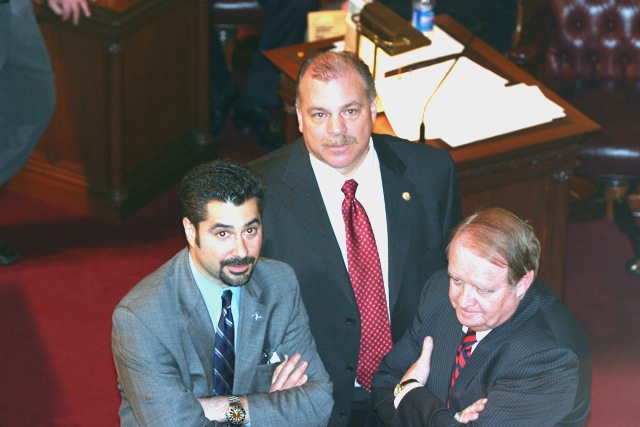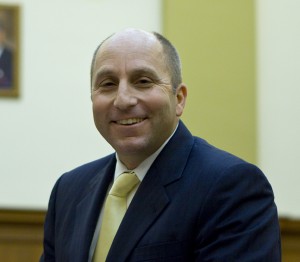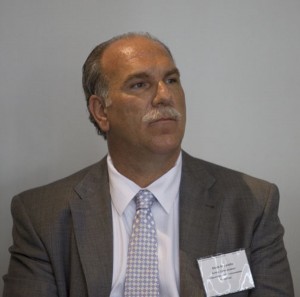Business Leaders Grill DEP Commissioner and Key Legislators
[Update: There were about 30 empty seats in the back and there weren’t many builder types at the NJBIA event. Chris Christie had a NJ Builders Assc. event the same day. I wonder what Christie promised the Builders? Were those empty seats builders? Or did the entire corporate crowd just migrate from the NJBIA breakfast to the NJBA luncheon?]
NJ Business and Industry leaders met behind closed doors today at posh Forsgate Country Club to press for more concessions on key environmental regulations to promote economic development.
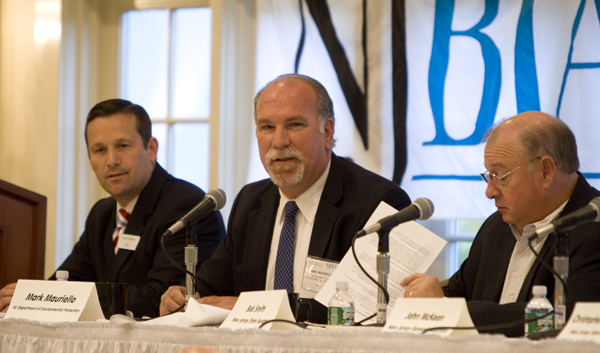
- DEP Commissioner Mark Mauriello (C) speaks to NJBIA at Forsgate CC – Senate Environment Committee Chair Bob Smith (D-Middlesex) (R) and Dave Brogan (NJBIA) (L)
The NJ BIA event, dubbed “Meet the Decision Makers” featured a panel discussion with DEP Commissioner Mark Mauriello, Senate Environment Committee Chairman Bob Smith (D-Middlesex), Assembly Environment Committee Chairman John McKeon (D-Essex), and Senator Kip Bateman (R-Somerset).
This kind of event – just weeks before a Gubernatorial election – is designed to send a clear political message to DEP to back off enforcement and to continue to weaken environmental regulations to promote economic development. It is another example of how powerful lobbyists for special interests are granted preferential high level access and are able to work behind the scenes to influence policy, gut environmental protections, and politicize science.
At a time when DEP budgets are slashed, work related travel eliminated, and the undue political influence of special interests is the focus of ethics and corruption investigations across the state, this event sends exactly the wrong message.
A September 28, 2009 email by DEP legislative aid John Hazen – who reports to Mauriello – reveals that Senator Smith demanded specific DEP replies to a series of questions to advance the NJBIA agenda.
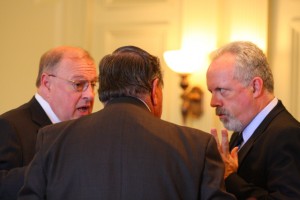
DEP Hazen (R) confers with Senators Smith (L) and Bucco (back facing) before Senate Environment Committee hearing (5/19/08)
Hazen solicited responses from DEP staffers to the following questions posed by NJBIA and conveyed to DEP by Smith:
John Hazen 9/28/2009 11:50 AM >>>
On October 9th NJBIA will be hosting Commissioner Mark Mauriello, Senator Bob Smith, Assemblyman John Mckeon And Senator Kip Bateman For A “Meet The Decision Makers Event”.
In preparation, Senator Smith’s office has contacted me to see if we can provide him with some background/briefing/info to answer the following questions. Can you please review the following and get back to me with a brief writeup on your respective topics? Thanks.
1. What are your goals going forward, not only in the Lame Duck Session, but beyond?
2. What is the status of the Licensed Site Remediation Professional program? How many temporary licenses have been issued? What is the status of the board?
3. What is the status of the Water Quality Management Planning process? Where have you seen problems? How are you dealing with the conflicts arising from the sewer service area maps the department is using?
4. What is the status of the Science Advisory Board? What are the first few issues you see them tackling?
5. If the bond act fails, do you see the need for an immediate stable source of funding for open space and farmland preservation? If the bond act passes are you still contemplating a water tax?
6. As companies do a better job at lowering emissions, what are the challenges you see in funding the Title V program? Is it fair to raise fees on companies that are taking steps to lower emissions and improve the overall air quality of the State?
7. What is the status of the State Water Supply Master Plan?
I managed to crash the event and below report the following discussion that ensued. This can give you a sense of the business community’s concerns.
Overall, I was disappointed but not surprised by the lack of vision or leadership on the environment.

former Governor Jim Florio was in attendance
I was appalled by how willing both DEP Commissioner Mauriello and legislators were to accommodate business demands.
I was shocked by Senator Smith’s remarks about stealing property, property rights, and an all out attack on new DEP Water Quality Management Planning rules. And I was embarrassed by the juvenile bashing and personal attacks on colleagues Dave Pringle and Jeff Tittel.
Following short introductory statements by the panelists, a question (Q) and answer (A) session took Place. Here is a summary.
1. Licensed Site Professionals (LSP) (this new program got the most discussion. NJBIA distributed a fact sheet to members. Here are EPA audits and our take on SRP and LSP)
What is the status? How many license applications?
A: (Mauriello) Irene Kropp has done a wonderful job in developing an entire new program. Nothing being done in the dark behind closed doors – open and transparent process, listening to stakeholders and advisory groups. Looking forward to looking the skeptics in the eye when the program is working About 90 applications submitted, 35 approved. Seeking guidance from the Governor’s Office on LSP Board appointments. Program takes effect Nov. 3, 2009 D Day. Good news for the environment and really good news for the regulated community.
2. What is the status of proposed rules to delist Cooper’s Hawk as a threatened species? A $40 million project is being held up. Additional projects worth hundreds of millions of dollars are being held up. Economy can’t afford that. DEP drafted rules years ago, but has not proposed. When will DEP propose these rules?
A: (Maurielo) I am familiar with your project. Thanks for the fax describing it. DEP draft rules undergoing legal review. Very close to proposal “expect proposal in next few months. In the meantime, what can the DEP do to expedite your project? Perhaps you should apply for other permits – we will issue.
3. What is status of Science Advisory Board (SAB)? (see this for background on SAB)
A: (Mauriello) The SAB was modeled on EPA SAB. Don’t know if you read blogs [Note: clearly a reference to this post], but our critics are wrong “ lots of scientific talent in NJ. I’ve made it clear that SAB will not review standards or drive policy. 160 scientists nominated or self nominated. Despite what blogs say, I had only my first meeting last week with DEP scientists to discuss SAB. Haven’t reviewed names of candidates. (Despite what the blogs say). Looking for diversity and balance.”
4. What is the status of the Report mandated by the Global Warming Response Act and development of regulations to implement the Global Warming Response Act (GWRA)?
A: (Mauriello) GWRA a bold law, but real work needs to be done. DEP implementing RGGI (20% portion of $60 million revenue) on forest and marsh sequestration. 300 application for funding under review. Staff are reviewing comments on the draft report. We just proposed new CAFRA rules to promote solar and wind. Final Report upcoming. No real regulatory focus, more incentives.
5. What is the status of the Water Supply Master Plan? Why doesn’t NJ go back to US Supreme Court on DRBC allocations, which are unfair to NJ?
A: (misunderstood the question, spent 5 minutes outlining USACOE flood data and reservoir storage; flood hazard regulations; and stream upgrades).
Q: Followup: You misunderstood my question “ I am concerned about WSMP science and models that determine safe yields and 1983 DRBC agreement. Current plan uses 25 year old data.
(there was a later follow-up question on WSMP)
A: (Mauriello) Draft final WSM plan is close. Delayed because DEP waited for new USGS data/model. Plan will identify new population projection growth based surplus/deficit areas, as well as what we need to do to transfer water to deficit areas. “We don’t tell people how to manage water“ purveyors have lots of expertise. We try to provide tools for management.
6. Would you support an extension of the Permit Extension Act, which expires in June 2010? Is such a bill likely to move in lame duck?
A: Smith: Yes
McKeon: Yes
Bateman: Yes

Tavit Najarian, consultant, asks about TMDLs and DEP's proposed new phosphorus water quality standards
7. The Clean Water Act’s Total Maximum Daily Load (TMDL) program lacks a sound scientific basis. DEP just revised the basis for the phosphorus standard from a numeric to a narrative basis. Why? How will this change impact TMDL’s already finished and under development?
A: (Mauriello – did not answer the questions). I agree that TMDL is inefficient and ineffective basis for setting permit discharge limits. I am looking at the entire TMDL program. DEP spends a lot of time and money developing TMDLs, and then litigating them in court. DEP must then face administrative appeals of permits when the TMDLs are used and incorporated in discharge permits. The TMDL program will be the first issue I charge the SAB to look into. I am sure that my science staff will hear about that in less than an hour (laughter).
8. What can DEP and legislators do to stop job loss and loss of production (e.g. recent Sunoco refinery closure)?
A: Smith – We shouldn’t be the problem
A: McKeon – that’s a complex question involving taxes and labor and the needs of a densely populated state of 9 million people. It will always be more expensive to live in NJ. We can work to expedite permits, but will not look the other way and compromise environmental protections which is short sighted and will poison the future of the state and make it an economic wasteland.
9. Solar panels are considered impervious surface which discourages installation. Why? We need guidance from DEP of new definition of impervious cover to stimulate solar on the ground.
A: (Mauriello) DEP doesn’t have statewide jurisdiction over IC – in CAFRA and Highlands yes. MLUL has inconsistent definitions too. Governor Corzine has directed me to make accommodations for renewable energy.
A: (Smith) – you need a bill to define IC. I will be introducing a bill soon to do that.
10. How can DEP promote sequestration of carbon in forests on private lands?
A: (Smith) – support S713 Forest stewardship plans as opposed to Forest Management Plans
11. Politics
a) Endorsements – What’s up with environmental groups endorsements? None backed Governor. Can we expect more surprises from them? (lot’s of laughter and jokes about Jeff Tittel and Dave Pringle)
A: Smith: “Anyone here in love with Jeff Tittel, please stand up”
Live by the sword, be prepared to die by the sword
A: Bateman: Give Dave Pringle credit.
A: McKeon: DEP has been reasonable on regulations, which is why the environmental groups don’t support the governor. If Corzine wins, the groups that didn’t endorse will lose influence and credibility. This will harm the environment because environmental groups will be perceived as paper tigers unable to influence voters and the public. This makes it harder to pass pro-environmental legislation or DEP initiatives. A set back for the environment.
A; Smith – Disagree with Bateman. Tittel/Pringle opposed LSP. Gov. did the right thing and took them on. There are 200+ environmental groups that disagree with Tittle/Pringle but can’t speak out due to 501C3 status. There are many other groups that support the Gov. but won’t speak out because they are afraid of Tittel/Pringle.
b) Anti-business climate – what can be done? DEP has worked extremely well with EDA and Gerold Zarro in Gov. Office. What more can be done?
c) Water Quality Management Planning rules – ant-development, takings and property rights
Smith went off. Big problem with WQMP rules. DEP planning to designate areas as non-sewer service areas based on old flawed maps and without knowledge or consent of land owners. This will shut down development. Big problem for land owners, builders, developers. In designated NSSA, are dead meat. My biggest beef is that this steals property rights “ we did it in the Highlands. This is unfair to property owners. All these land owners whose land is about to be designated NSSA should be aware. Oh, we’re careful not to trigger a legal taking, but we come close and steal property rights. DEP maps and aerial photos are flawed. Site in my district whre a COAH project is designated NSSA. I support Sarlo bill to place 2 year moratorium on implementation of new WQMP rules. Provide notice to property owners and opportunity to challenge DEP designations. Sorry if this sounds anti-environmental but I’ve already stolen 500,000 acres in this state (Highlands?). Some NSSA lands broadly designated by mere possibility of T&E habitat. We’ve taken 60% of the land area of the state in Planning Areas 3,4, and 5. You can’t build anything new there. If you own property call you county planning board and find out about NSSA designation.
Mauriello pushed back effectively, acknowledged working to relax deadlines and be flexible, but new rules required because plans are so old and flawed, and don’t consider water supply, wetlands, and other environmental constraints that would prohibit the issuance of land use permits. Working on more notice to landowners. Working on maps – bog turtle habitat suitability improper in some places. TWA permits grandfathered. My goal is to pre-empt the need for the Sarlo legislative moratorium bill – DEP is making concessions. (we wrote about the Sarlo bill here)
d) Lame Duck Priorities – Smith:
Forest stewardship
ATV registration
Greenwood Lake Commission fee authorization
Restrictions on nitrogen fertilizers – Barnegat Bay eutrophication
Salwater fishing registration
Dam restoration
Next Session priorities – Smith
Focus on Barnegat Bay ecosystem (we wrote about Barnegat Bay here)
Energy bills – renewables
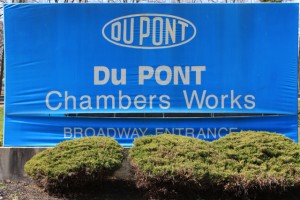


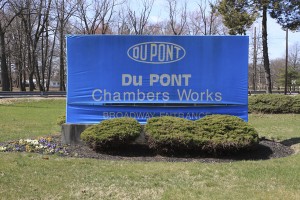 Since then, we received additional leaked DEP documents and emails which show that the
Since then, we received additional leaked DEP documents and emails which show that the 